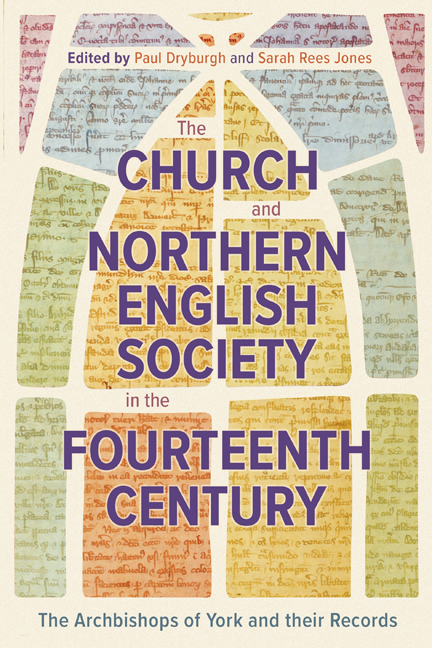 The Church and Northern English Society in the Fourteenth Century
The Church and Northern English Society in the Fourteenth Century Book contents
- Frontmatter
- Dedication
- Contents
- List of Illustrations
- List of Contributors
- Acknowledgements
- List of Abbreviations
- Map: The Ecclesiastical Province of York, c. 1304–1405
- Introduction
- 1 The Administrative Records of the Archbishops of York, 1304–1405
- 2 The Archbishops of York and the Government of Fourteenth-Century England
- 3 Support or Scourge? Archbishop William Melton and the Tradition of Loyal Opposition to the English
- 4 Beyond the Border: The Influence of York Clerks in the Two Edwards’ Scottish Administrations, 1332–1357
- 5 Responding to Royal Requirements: Clerical Taxation in the Province of York, 1304–1405
- 6 Ad insolenciam ipsius rebellis salubrius reprimendam: William Thorntoft, the Abbey of Rufford and Significations of Excommunication in the Northern Province
- 7 Blood, Sex and Holy Water: Reconciling Churches and Churchyards in the Medieval Diocese of York
- 8 Structuring Episcopal Authority: Palaces and Residences of the Archbishop of York
- 9 Medieval Parks of the Archbishops of York
- 10 Northern Ways? Pilgrimage, Politics and Piety in the Fourteenth-Century Administrative Records of the Archdiocese of York
- 11 Underexplored Sources for Gender History: New Approaches to the Fourteenth-Century York Archbishops’ Registers
- 12 Joan of Leeds and other Apostate Nuns in the Province of York, 1300–1350
- Bibliography of Records of the Archbishops of York, 1304–1405
- Index
5 - Responding to Royal Requirements: Clerical Taxation in the Province of York, 1304–1405
Published online by Cambridge University Press: 17 May 2024
- Frontmatter
- Dedication
- Contents
- List of Illustrations
- List of Contributors
- Acknowledgements
- List of Abbreviations
- Map: The Ecclesiastical Province of York, c. 1304–1405
- Introduction
- 1 The Administrative Records of the Archbishops of York, 1304–1405
- 2 The Archbishops of York and the Government of Fourteenth-Century England
- 3 Support or Scourge? Archbishop William Melton and the Tradition of Loyal Opposition to the English
- 4 Beyond the Border: The Influence of York Clerks in the Two Edwards’ Scottish Administrations, 1332–1357
- 5 Responding to Royal Requirements: Clerical Taxation in the Province of York, 1304–1405
- 6 Ad insolenciam ipsius rebellis salubrius reprimendam: William Thorntoft, the Abbey of Rufford and Significations of Excommunication in the Northern Province
- 7 Blood, Sex and Holy Water: Reconciling Churches and Churchyards in the Medieval Diocese of York
- 8 Structuring Episcopal Authority: Palaces and Residences of the Archbishop of York
- 9 Medieval Parks of the Archbishops of York
- 10 Northern Ways? Pilgrimage, Politics and Piety in the Fourteenth-Century Administrative Records of the Archdiocese of York
- 11 Underexplored Sources for Gender History: New Approaches to the Fourteenth-Century York Archbishops’ Registers
- 12 Joan of Leeds and other Apostate Nuns in the Province of York, 1300–1350
- Bibliography of Records of the Archbishops of York, 1304–1405
- Index
Summary
Li rois ne l’apostoile ne pensent altrement,
Mès coment au clers tolent lur or e lur argent.
Co est tute la summe,
ke la pape de Rume
Al rei trop consent,
pur aider sa curune
la dime de clers li dune,
De ço en fet sun talent.
(The king and the pope think of nothing else, / but how they may take their gold and their silver from clerics. / This is the whole affair, / that the pope of Rome / yields too much to the king, / to help his crown, / the tenth of the clergy's goods he gives him, / and with that he does his will.)So complained an unidentified mid-thirteenth-century cleric, perhaps at the time of the ‘Taxation of Norwich’. If the clergy thought things were bad in 1256, they were going to suffer much more towards the end of the century. Edward I demanded tax after tax, based on the 1291 valuation, known as the Taxatio of Pope Nicholas IV, culminating in 1294 in the imposition of a moiety, or half, of clerical revenue. As Archbishop Greenfield was consecrated in York in 1306, and even into the episcopate of Archbishop Melton (1317–40), royal officials were still pursuing arrears of these taxes.
As this complaint from the clergy indicates, clerical taxation was initially levied by successive popes, ostensibly for Crusading purposes. Between 1305 and 1333, seven papal taxes were imposed: seven tenths in 1305; four tenths in 1309; six tenths were decreed in 1312 at the Council of Vienne, called to discuss the fate of the Templars, and attended by both Archbishop Greenfield and Bishop Halton of Carlisle; one in 1317; two in 1322; four in 1330; and six in 1333. In the event, only fourteen papal tenths were actually collected and almost all the receipts were handed to the English king.
The 1317 papal tax was exacted when the Northern Province was complaining of devastation caused by Scottish incursions after Bannockburn. As early as July 1317, Edward II instructed the archdeacon of Richmond to reassess the value of the benefices in his archdeaconry. This archdeacon was Roger Northburgh, the keeper of the king's wardrobe, who had been captured at Bannockburn and so was in a good position to catch the king's ear about the difficulties of the province.
- Type
- Chapter
- Information
- The Church and Northern English Society in the Fourteenth CenturyThe Archbishops of York and their Records, pp. 151 - 171Publisher: Boydell & BrewerPrint publication year: 2024


